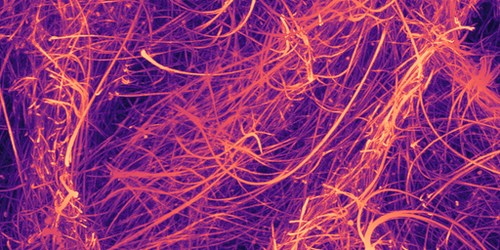Professor Daniel Blair and co-workers investigate viscosity of active microtubules

In an article titled “Shear-Induced Gelation of Self-Yielding Active Networks”, recently published in Physical Review Letters, postdoctoral researchers David Gagnon and Claudia Dessi, Professor Daniel Blair, and their collaborators studied the rheology of microtubule-based active materials. Microtubules are nanoscale intracellular tubes that provide structure and motor functions for cells. In solution with kinesin motor complexes, microtubule bundles fray, buckle, and reconnect, creating a continually rearranging network. Combining microscopy and rheology, Blair and co-workers quantified the relationship between the microscopic dynamics and the bulk mechanical properties of these networks, revealing a surprising nonmonotonic viscosity that depends on the relative magnitude of the rate of internally generated activity (controlled by ATP concentration) and the externally applied shear. Blair notes that this ability to dramatically tune the viscosity of the material by adjusting the ATP concentration could be useful in the design of biomimetic systems.
Article: https://go.aps.org/31xlkna
Synopsis: https://go.aps.org/31xlr24
